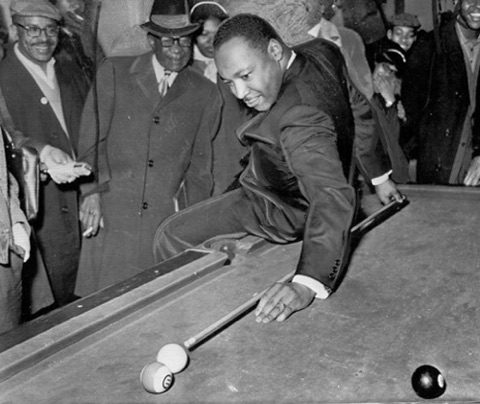Remembering The Legacy Of Civil Rights Leader Martin Luther King Jr.

FLIP SCHULKE/CORBIS
Forty-eight years after his death, Martin Luther King, Jr. still stands as one of the most symbolic, most loved and most tragic of figures of the Civil Rights Movement.
This year, the home where the civil rights leader was born in some 88 years ago, will reopen after being closed since August for repairs. The modest Atlanta, Ga. home at 450 Auburn Ave. N.E. was originally built in 1895. The historic site typically draws up to 20,000 visitors on Martin Luther King, Jr. Day, which caused some wear and tear. After repairs to the first floor of the house, where King lived until age 12, it will open again to the public in time for the MLK holiday.
Across the country, Americans are honoring King through rallies, services and days of service. Here, in honor of Martin Luther King, Jr. Day, take a look back at his life and some of his greatest accomplishments.
Son of a Preacher Man
King was born Jan. 15, 1929, in Atlanta, Ga., to Rev. Martin Luther King, Sr. and Alberta Williams King.
He studied theology, eventually earning a Ph.D. and following in his father’s footsteps, becoming a preacher. Eventually, the two Rev. Kings would co-pastor Ebenezer Baptist Church in Atlanta until the younger King’s death in 1968.
In the photo below, Martin Luther King, Jr. looks on as his father delivers a sermon.
A Family of Kings
King married Coretta Scott on June 18, 1953. The couple would go on to have four children. After his death, the King family, led by Coretta, took on his mission of promoting racial equality.
Peaceful Protest
In this photo from June 1963, King leads a march of mourners in a funeral procession for fellow civil rights leader Medgar Evers.
Known for his marches and peaceful protests, King was still arrested 30 times, according to the King Center.
A Fitting Farewell
King delivered his “I Have a Dream” speech to a crowd of civil rights activists gathered at the Lincoln Memorial on Aug. 28, 1963.
The moment and the phrase, “I have a dream…” have gone down in history as the pinnacle moment of his career.
Peace Prize
Famous for his non-violent protests, King was awarded the Nobel Peace Prize in 1964. At age 35, he was the youngest man, the second American and the third black man to be so honored, according to the King Center.
Voting Rights
In this photo, dated Aug. 5, 1965, King meets with President Lyndon B. Johnson and other civil rights leaders.
The following day, President Johnson signed the 1965 Voting Rights Act, outlawing discriminatory voting practices.
A Fitting Farewell
King was shot and killed while standing on the balcony of the Lorraine Motel in Memphis, Tenn., on April 4, 1968.
Thousands of mourners, including the Rev. Jesse Jackson (pictured at right), attended the funeral.
A Lasting Legacy
Mourners at King’s funeral procession show their support for the iconic figure.
Only four days after his death, the first legislation providing for a Martin Luther King, Jr. federal holiday was filed. It would take until June 7, 1999, for all 50 states to recognize the holiday, according to the King Center. The third Monday of January is now officially Martin Luther King, Jr. Day across the country.
Photo credits: Corbis








